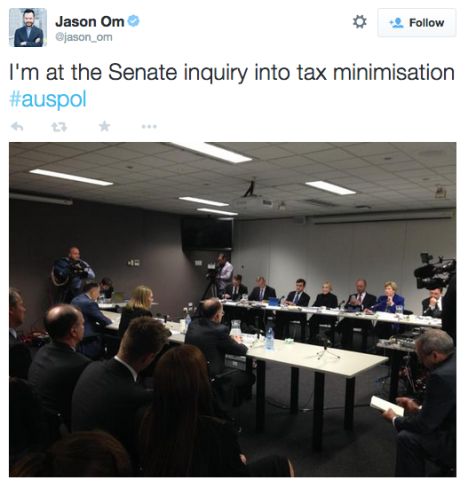The media tax debate: Is it being used as a distraction for the broken business model?
 Yesterday saw Google, Apple, Microsoft and News Corp Australia front a Senate Committee on corporate tax avoidance. The event was high on drama, Nic Christensen argues, but while the tax discussion is important, too many traditional media businesses use it as a distraction for ignoring their disrupted business models.
Yesterday saw Google, Apple, Microsoft and News Corp Australia front a Senate Committee on corporate tax avoidance. The event was high on drama, Nic Christensen argues, but while the tax discussion is important, too many traditional media businesses use it as a distraction for ignoring their disrupted business models.
As a piece of entertainment, yesterday’s Senate Economic References Committee on corporate tax avoidance was superb theatre.
Start with a cast of excellent characters (hello: Senators Dastyari, Xenophon, Milne plus the likes of Julian Clarke and even the normally camera-shy Maile Carnegie), add a large national stage (hello: saturation national press) and then add just the right amount of tension (usually Xenophon or Milne demanding that their question actually be answered) and you had quite a show.
 The appearance is, rightly, dominating today’s headlines and I know we’ve given significant coverage to the evidence of both Google/Apple/Microsoft and also the testimony of News Corp.
The appearance is, rightly, dominating today’s headlines and I know we’ve given significant coverage to the evidence of both Google/Apple/Microsoft and also the testimony of News Corp.


How is the Coalition going to convince the average Australian tax payer to tighten their bets with this going on? It’s like their mates at big fat end of town have rolled over to epose their soft underbelly. Here’s you chance Labor – -step up.
The Taylor Swift and Spotify debate is a distraction from the broken record [!] industry model.
We simply do not need the film, music and entertainment businesses of old when artists and producers can be directly connected to consumers through new digital platforms. With social media able to fund projects and promote them organically the old businesses are adding no value only costs.
A quality piece of journalism and well written.
Thank you.
I don’t like being uncompetitive either. My small business pays its full 30% company tax, and then I pay my personal income tax. Why the hell can’t businesses that can afford to tax pay it!
Nic, this is an odd commentary. First, you don’t seem to understand the essential issue. Which is that money previously taxed is no longer taxed. That is, advertising spend and profit. Because Google has taken the market and Google chooses to pay tax in other places, namely Singapore and Ireland. You also don’t seem to notice the red herrings. Alibaba is a competitor for Amazon, not Google. Google has eaten its competitors whole.
The point here is that every other business and taxpayer operating in Australia has to pay more tax when BHP, Google and others ae able to choose to pay Singapore tax.
How that is contorted into a Fairfax delusion over broken business models is totally beyond me.